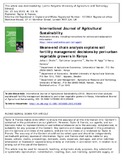| dc.contributor.author | Largerkvist, CJ | |
| dc.contributor.author | Ngigi, MW | |
| dc.contributor.author | Karanja, N | |
| dc.date.accessioned | 2013-07-25T10:20:25Z | |
| dc.date.available | 2013-07-25T10:20:25Z | |
| dc.date.issued | 2013 | |
| dc.identifier.citation | Okello, J. J., Largerkvist, C. J., Ngigi, M. W., & Karanja, N. (2013). Means-end chain analysis explains soil fertility management decisions by peri-urban vegetable growers in Kenya. International Journal of Agricultural Sustainability, (ahead-of-print), 1-17. | en |
| dc.identifier.uri | http://erepository.uonbi.ac.ke:8080/xmlui/handle/123456789/51115 | |
| dc.description.abstract | Past studies of the use of soil fertility management strategies by farmers usually model input use decisions based on the neoclassical utility/profit maximization principle in which farmers use soil fertility management inputs primarily to increase revenues and profits. However, there is, to date, no study that explains exactly how this decision-making process occurs and the role which personal values play in driving the choice of soil fertility management inputs. This article systematically maps the relationship between choice of soil fertility management strategy (attributes), its outcomes (consequences) and the personal values that motivate the choice. It specifically uses the means-end chain approach to construct hierarchical value maps that relate the attributes to consequences, and ultimately to the personal values. The study finds that the use of soil fertility management strategies by peri-urban fresh vegetable growers is driven by five personal values, namely happiness, comfortable life, independence, good/healthy life and achievement of life goals. It also finds that while farmers seek to increase profit (hence incomes), profit maximization is not the end driver of the use of soil fertility management inputs. It concludes that a lot more goes into farmers’ decision-making process relating to the use of soil fertility management practices than can be explained by the neoclassical profit/utility maximization principle. The study discusses the policy implications of these findings. | en |
| dc.language.iso | en | en |
| dc.publisher | University of Nairobi, | en |
| dc.subject | peri-urban vegetable farmers | en |
| dc.subject | manure and fertilizer use | en |
| dc.subject | personal values | en |
| dc.subject | means-end chain approach | en |
| dc.title | Means-end chain analysis explains soil fertility management decisions by peri-urban vegetable growers in Kenya | en |
| dc.type | Article | en |
| local.publisher | college of agriculture and veterinary sciences, | en |

